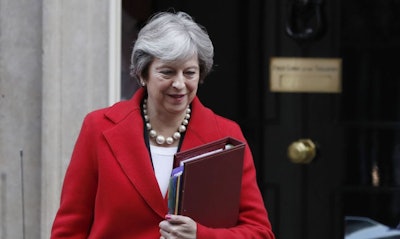
Britain's Treasury chief has outlined cautious spending plans to a nation bracing for the shock of leaving the European Union, amid a stream of worsening of economic forecasts that hampered room for giveaways.
Philip Hammond revealed the deteriorating outlook in his annual budget speech to Parliament on Wednesday, with slowing growth and a stubborn deficit offering little space to increase spending in the face of demands from teachers, firefighters, police and the military. Adding to the pressure for fiscal restraint was the need to preserve state coffers for the potential turmoil of Brexit.
"We are at a turning point in our history," Hammond told the House of Commons. "And we resolve to look forwards, not backwards."
Hammond set aside 3 billion pounds ($3.9 billion) over two years to prepare for Brexit and offered a package of initiatives to build new homes and ease the country's housing shortage, but he otherwise sidestepped eye-popping initiatives. He promised to "invest in the future," with money to improve infrastructure, spur the development of new technologies and teach advanced mathematics to more children.
"More maths for everyone," Hammond said in a cheerful effort to put the best face on things. "Don't let anyone say I don't know how to show the nation a good time!"
Hammond, who has been nicknamed "Eeyore" because of his cautious approach, had been under pressure to appear upbeat about the economy's prospects after Brexit. Prime Minister Theresa May's weakened government was hoping for excitement without controversy — particularly since anything too revolutionary might get voted down.
The Chancellor of the Exchequer tried to paint an optimistic vision of a "global Britain" that would embrace the technological revolution and capitalize on the opportunities presented by leaving the EU. He promised an approach that would be "balanced" amid pleas to end austerity.
And though Hammond did his best to put a happy stamp on things — Britain's Press Association described him as the chortling chancellor — the part of his speech he himself described as "economicky" revealed the painful truth. The economy is slowing.
The Office of Budget Responsibility, an independent body that provides the chancellor with forecasts, said it expects the economy to expand 1.5 percent this year, 1.4 percent in 2018, and 1.3 in both 2019 and 2020, before picking up to 1.5 percent and finally 1.6 percent in 2022. The OBR also cut its forecast for worker productivity over the next five years.
By contrast, the neighboring eurozone economy was growing at a 2.5 percent annual rate at last count.
Slower growth and lower productivity mean British tax revenues are likely to grow more slowly in coming years, making it harder for the government to ease the austerity that has characterized budgets since the global financial crisis swelled Britain's debt.
While Hammond announced progress on the budget deficit, saying it would fall below 2 percent of GDP next year, Britain still faces relatively high debt.
Public borrowing rose more than expected in October, driven by higher borrowing costs. Debt will peak at 86.5 percent of GDP this year, Hammond said. That compared with less than 40 percent in 2007, the Office for National Statistics said Tuesday.
"Mr Hammond is like David throwing pebbles at the Goliath of the productivity and growth challenges that the U.K. faces after Brexit," said Lucy O'Carroll, chief economist at Aberdeen Standard Investments. "Today could have been a golden opportunity to take a distinct, long-term view of the U.K.'s prospects, tackling the country's productivity performance head on. ... Unfortunately, the Chancellor lacks the political capital to take such a dynamic approach."
Opposition leader Jeremy Corbyn, whose fortunes have been on the rise of late, was quick to criticize the government's plans, highlighting that many in this country are struggling.
"Our country . is marked by growing inequality and injustice," he said. "We were promised, with lots of hype, a revolutionary budget. The reality is nothing has changed. People were looking for help from this budget and they've been let down."






















